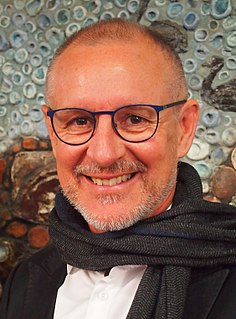A Quote by Henry David Thoreau
We believe that the possibility of the future far exceeds the accomplishment of the past. We review the past with the common sense, but we anticipate the future with transcendental senses. In our sanest moments we find ourselves naturally expecting or prepared for far greater changes than any which we have experienced within the period of distinct memory, only to be paralleled by experiences which are forgotten.
Related Quotes
I teach you that there is no other aim than to live with such totality that each moment becomes a celebration. The very idea of "aim" brings future into the mind, because any aim, any end, any goal, needs future. All your goals deprive you of your present, which is the only reality you have. The future is only your imagination, and the past is just footprints left in the sands of your memory. Neither is the past real anymore, nor is the future real yet. This moment is the only reality.
If history is to be creative, to anticipate a possible future without denying the past, it should, I believe, emphasize new possibilities by disclosing those hidden episodes of the past when, even if in brief flashes, people showed their ability to resist, to join together, occasionally to win. I am supposing, or perhaps only hoping, that our future may be found in the past's fugitive movements of compassion rather than in its solid centuries of warfare.
Past, n. That part of Eternity with some small fraction of which we have a slight and regrettable acquaintance. A moving line called the Present parts it from an imaginary period known as the Future. These two grand divisions of Eternity, of which the one is continually effacing the other, are entirely unlike. The one is dark with sorrow and disappointment, the other bright with prosperity and joy.... Yet the Past is the Future of yesterday, the Future is the Past of to-morrow. They are one-the knowledge and the dream.
The human condition can almost be summed up in the observation that, whereas all experiences are of the past, all decisions are about the future. It is the great task of human knowledge to bridge this gap and to find those patterns in the past which can be projected into the future as realistic images.
As far as me, I'm just looking forward to the future. There's a lot of people that look to the past. I've learned from the past, absolutely. I know my past absolutely. I'm not discrediting or... ignoring my past in any way, but my focus has always been moving forward, moving forward into the future.
What you think of as they past is a memory trace, stored in the mind, of a former Now. When you remember the past, you reactivate a memory trace -- and you do so now. The future is an imagined Now, a projection of the mind. When the future comes, it comes as the Now. When you think about the future, you do it now. Past and future obviously have no reality of their own. Just as the moon has no light of its own, but can only reflect the light of the sun, so are past and future only pale reflections of the light, power, and reality of the eternal present. Their reality is "borrowed" from the Now.
How we view ourselves can often determine the perspective and degree in which we see others and the world around us. Each and every one of us has a view. Such a view, that it can shape the future of others and how they live, dream and look towards the future that we all hope is better and more fruitful than our past. This I believe is a common initiative.
When we let go of our battles and open our heart to things as they are, then we come to rest in the present moment. This is the beginning and the end of spiritual practice. Only in this moment can we discover that which is timeless. Only here can we find the love that we seek. Love in the past is simply memory, and love in the future is fantasy. Only in the reality of the present can we love, can we awaken, can we find peace and understanding and connection with ourselves and the world.
The establishment of inner harmony is to be attained neither in the past nor in the future, but where the past and future meet, which is the now. When you have attained that point, neither future nor past, neither birth nor death, neither time nor space exist. It is that NOW which is liberation, which is perfect harmony, to which the men of the past and the men of the future must come.
Of all the endless variety of phenomena which nature presents to our senses, there is none that fills our minds with greater wonder than that inconceivably complex movement which, in its entirety, we designate as human life; Its mysterious origin is veiled in the forever impenetrable mist of the past, its character is rendered incomprehensible by its infinite intricacy, and its destination is hidden in the unfathomable depths of the future... .
We who run in the way of Love must never torment ourselves about anything. If I did not suffer minute by minute, it would be impossible for me to be patient; but I see only the present moment, I forget the past, and take good care not to anticipate the future. If we grow disheartened, if sometimes we despair, it is because we have been dwelling on the past or the future.
What the nostalgic past and the imaginary future seem to share in common is a form of idealism, perhaps a dream of wholeness. Our future is just as goopy with sentiment as our past. To me, they're the same, both very tempting, and I don't believe in either, although the idealism is probably important.



































